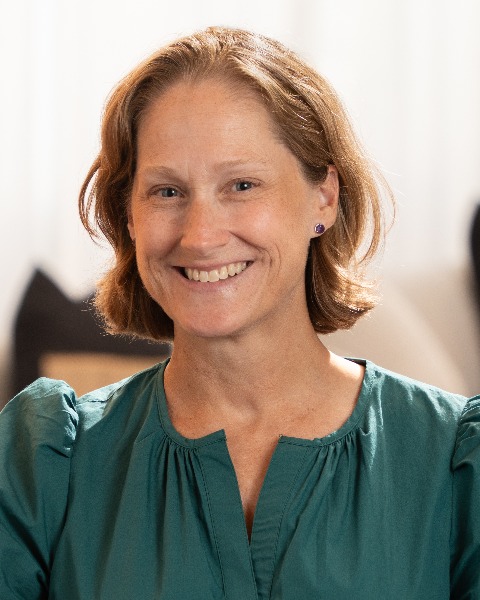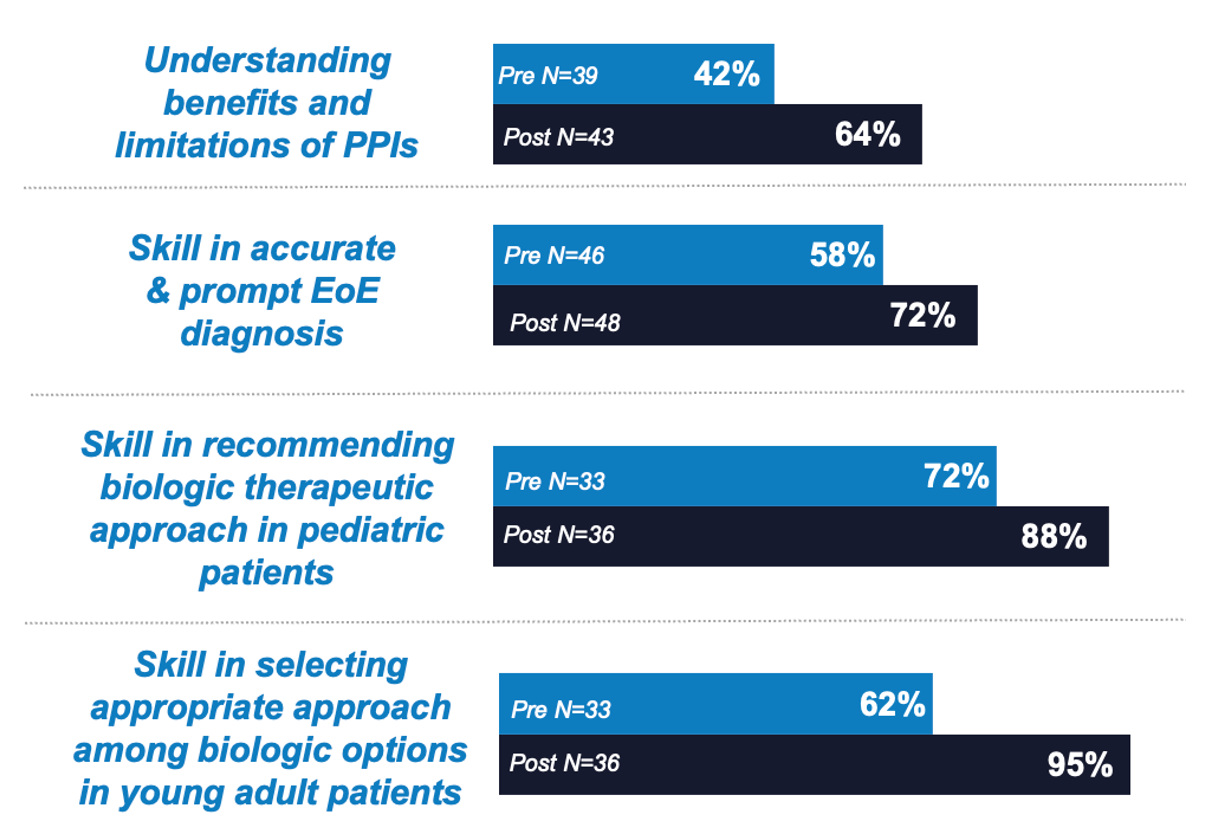Monday Poster Session
Category: Esophagus
P2791 - Shifting the Center of Gravity in EoE Care: Advancing Community Clinician Preparedness for Biologic Integration Through Innovative ECHO-Based Learning
Monday, October 27, 2025
10:30 AM - 4:00 PM PDT
Location: Exhibit Hall

Jennifer Boyd, MBA, CHCP
PVI, PeerView Institute for Medical Education
Bryn Mawr, PA
Presenting Author(s)
Jennifer Boyd, MBA, CHCP1, Mary Grecco, BA2, Erica Treventi, BA3, Michael Beyer, BS4, Ted Singer, BA, CHCP5, Linda G.. Baer, MSPH, CHCP6, Michael Burk, BS6, Christopher Huang, MD7, Mirna Chehade, MD, MPH8, Evan S. Dellon, MD, MPH9, Robert D. Pesek, MD10, Thomas Kintanar, MD11, Shana Segal, MD12, Ryan Piansky, BS13
1PVI, PeerView Institute for Medical Education, Bryn Mawr, PA; 2PVI, PeerView Institute for Medical Education, Middletown, NJ; 3PVI, PeerView Institute for Medical Education, Poughkeepsie, NY; 4PVI, PeerView Institute for Medical Education, Brooklyn, NY; 5PVI, PeerView Institute for Medical Education, Mount Kisco, NY; 6Barry M. Manuel Center for Continuing Education, Boston University Chobanian & Avedisian School of Medicine, Boston, MA; 7Boston University Chobanian & Avedisian School of Medicine, Boston, MA; 8Mount Sinai Center for Eosinophilic Disorders, Icahn School of Medicine at Mount Sinai, New York, NY; 9Center for Esophageal Diseases and Swallowing, University of North Carolina School of Medicine, Chapel Hill, NC; 10University of Arkansas for Medical Sciences and Arkansas Children’s Hospital, Little Rock, AR; 11Indiana University School of Medicine, Indianapolis, IN; 12The Children's Hospital of Philadelphia, Philadelphia, PA; 13Georgia Institute of Technology, Atlanta, GA
Introduction: Eosinophilic esophagitis (EoE) is a chronic, progressive disease requiring nuanced management beyond standard of care interventions. With the availability of biologic therapies, providers face increasingly complex management decisions. This Project ECHO® initiative aimed to build competency in gastroenterologists, specialty advanced practice providers, and other healthcare professionals involved in the care of people with EoE through case-based learning and collaborative dialogue.
Methods: From January-April 2025, 4 live, interactive sessions engaged learners with a multidisciplinary faculty in learner-directed, case-based discussions. Each featured a brief didactic segment, facilitated case presentation and Q&A with specialists in gastroenterology, emergency medicine, pediatrics, allergy, family medicine, and a patient with EoE. By highlighting real-world challenges in care, community-based professionals received guidance enabling a rapid enhancement of their practice. A comprehensive on-demand activity, launched in November 2024, served as a reference for ECHO participants and expanded the initiative to a national audience. Transcripts were analyzed thematically to identify patterns in learning and inquiry. Outcomes were assessed through pre/post-activity surveys and intent-to-change metrics.
Results: A total of 1,655 learners participated (188 in live sessions; 1,467 on-demand). Qualitative data from the ECHO revealed significant value and cross-disciplinary learning. Across sessions, 15+ distinct biologic-related questions emerged, such as optimal timing to initiate biologics in pediatric vs. adult patients and comparing biologics to PPIs/diet in long-term remission and safety. The ECHO also demonstrated impact on clinical decision-making: post-session evaluations showed gains of 16–33 percentage points in skills related to biologic therapy selection for pediatric and young adult patients and in the understanding of PPI limitations (Figure 1).
Discussion: This program highlights the value of multiformat educational design. As the enduring content achieved scale, ECHO’s peer-driven format provided opportunities for deeper inquiry and problem-solving, surfacing critical clinical ambiguities—how to personalize treatment, how to manage comorbid atopy—that highlighted community voices as integral to evolving best practices. This example of combining scale and depth to meet learner needs may serve as a model to benefit future educational design in evolving therapeutic areas.

Figure: Figure 1. Improvements in clinical decision-making skills among ECHO learners
Disclosures:
Jennifer Boyd indicated no relevant financial relationships.
Mary Grecco indicated no relevant financial relationships.
Erica Treventi indicated no relevant financial relationships.
Michael Beyer indicated no relevant financial relationships.
Ted Singer indicated no relevant financial relationships.
Linda Baer indicated no relevant financial relationships.
Michael Burk indicated no relevant financial relationships.
Christopher Huang: Olympus – Consultant.
Mirna Chehade: Adare Pharma Solutions/Ellodi Pharmaceuticals – Consultant, Grant/Research Support. Allakos – Consultant, Grant/Research Support. AstraZeneca – Consultant, Grant/Research Support. Bristol Myers Squibb – Consultant. Celgene – Grant/Research Support. Danone – Grant/Research Support. Nexstone Immunology/Uniquity Bio – Consultant. Phathom Pharmaceuticals – Consultant. Recludix Pharma – Consultant. Regeneron Pharmaceuticals Inc. – Consultant, Grant/Research Support. Sanofi – Consultant. Shire/Takeda – Consultant, Grant/Research Support.
Evan Dellon: AbbVie – Consultant. Adare/Ellodi – Consultant, Grant/Research Support. Akesobio – Consultant. Alfasigma – Consultant. ALK – Consultant. Allakos – Consultant, Grant/Research Support. Amgen – Consultant. Apogee – Consultant. Apollo – Consultant. Aqilion – Consultant, Grant/Research Support. Arena/Pfizer – Consultant, Grant/Research Support. Aslan – Consultant. AstraZeneca – Consultant, Grant/Research Support. Avir – Consultant. Biocryst – Consultant. Bryn – Consultant. Calypso – Consultant. Celgene/Receptos/Bristol Myers Squibb – Consultant, Grant/Research Support. Celldex – Consultant, Grant/Research Support. Dr. Falk Pharma – Consultant. EsoCap – Consultant. Eupraxia – Consultant, Grant/Research Support. Ferring – Consultant, Grant/Research Support. GI Reviewers – Consultant. GSK – Consultant, Grant/Research Support. Holoclara – Consultant, Grant/Research Support. Invea – Consultant, Grant/Research Support. Knightpoint – Consultant. LucidDx – Consultant. Meritage – Grant/Research Support. Miraca – Grant/Research Support. Morphic – Consultant. Nexstone Immunology/Uniquity – Consultant. Nutricia – Consultant, Grant/Research Support. Parexel/Calyx – Consultant. Phathom – Consultant. Regeneron Pharmaceuticals Inc. – Consultant, Grant/Research Support. Revolo – Consultant, Grant/Research Support. Robarts/Alimentiv – Consultant. Sanofi – Consultant, Grant/Research Support. Shire/Takeda – Consultant, Grant/Research Support. Target RWE – Consultant. Third Harmonic Bio – Consultant. Uniquity – Grant/Research Support. Upstream Bio – Consultant.
Robert Pesek: Regeneron Pharmaceuticals Inc. – Advisory board/consulting fees.
Thomas Kintanar: Bayer HealthCare Pharmaceuticals, Inc – Speaker. Otsuka Holdings Co., Ltd / Lundbeck – Speaker.
Shana Segal indicated no relevant financial relationships.
Ryan Piansky indicated no relevant financial relationships.
Jennifer Boyd, MBA, CHCP1, Mary Grecco, BA2, Erica Treventi, BA3, Michael Beyer, BS4, Ted Singer, BA, CHCP5, Linda G.. Baer, MSPH, CHCP6, Michael Burk, BS6, Christopher Huang, MD7, Mirna Chehade, MD, MPH8, Evan S. Dellon, MD, MPH9, Robert D. Pesek, MD10, Thomas Kintanar, MD11, Shana Segal, MD12, Ryan Piansky, BS13. P2791 - Shifting the Center of Gravity in EoE Care: Advancing Community Clinician Preparedness for Biologic Integration Through Innovative ECHO-Based Learning, ACG 2025 Annual Scientific Meeting Abstracts. Phoenix, AZ: American College of Gastroenterology.
1PVI, PeerView Institute for Medical Education, Bryn Mawr, PA; 2PVI, PeerView Institute for Medical Education, Middletown, NJ; 3PVI, PeerView Institute for Medical Education, Poughkeepsie, NY; 4PVI, PeerView Institute for Medical Education, Brooklyn, NY; 5PVI, PeerView Institute for Medical Education, Mount Kisco, NY; 6Barry M. Manuel Center for Continuing Education, Boston University Chobanian & Avedisian School of Medicine, Boston, MA; 7Boston University Chobanian & Avedisian School of Medicine, Boston, MA; 8Mount Sinai Center for Eosinophilic Disorders, Icahn School of Medicine at Mount Sinai, New York, NY; 9Center for Esophageal Diseases and Swallowing, University of North Carolina School of Medicine, Chapel Hill, NC; 10University of Arkansas for Medical Sciences and Arkansas Children’s Hospital, Little Rock, AR; 11Indiana University School of Medicine, Indianapolis, IN; 12The Children's Hospital of Philadelphia, Philadelphia, PA; 13Georgia Institute of Technology, Atlanta, GA
Introduction: Eosinophilic esophagitis (EoE) is a chronic, progressive disease requiring nuanced management beyond standard of care interventions. With the availability of biologic therapies, providers face increasingly complex management decisions. This Project ECHO® initiative aimed to build competency in gastroenterologists, specialty advanced practice providers, and other healthcare professionals involved in the care of people with EoE through case-based learning and collaborative dialogue.
Methods: From January-April 2025, 4 live, interactive sessions engaged learners with a multidisciplinary faculty in learner-directed, case-based discussions. Each featured a brief didactic segment, facilitated case presentation and Q&A with specialists in gastroenterology, emergency medicine, pediatrics, allergy, family medicine, and a patient with EoE. By highlighting real-world challenges in care, community-based professionals received guidance enabling a rapid enhancement of their practice. A comprehensive on-demand activity, launched in November 2024, served as a reference for ECHO participants and expanded the initiative to a national audience. Transcripts were analyzed thematically to identify patterns in learning and inquiry. Outcomes were assessed through pre/post-activity surveys and intent-to-change metrics.
Results: A total of 1,655 learners participated (188 in live sessions; 1,467 on-demand). Qualitative data from the ECHO revealed significant value and cross-disciplinary learning. Across sessions, 15+ distinct biologic-related questions emerged, such as optimal timing to initiate biologics in pediatric vs. adult patients and comparing biologics to PPIs/diet in long-term remission and safety. The ECHO also demonstrated impact on clinical decision-making: post-session evaluations showed gains of 16–33 percentage points in skills related to biologic therapy selection for pediatric and young adult patients and in the understanding of PPI limitations (Figure 1).
Discussion: This program highlights the value of multiformat educational design. As the enduring content achieved scale, ECHO’s peer-driven format provided opportunities for deeper inquiry and problem-solving, surfacing critical clinical ambiguities—how to personalize treatment, how to manage comorbid atopy—that highlighted community voices as integral to evolving best practices. This example of combining scale and depth to meet learner needs may serve as a model to benefit future educational design in evolving therapeutic areas.

Figure: Figure 1. Improvements in clinical decision-making skills among ECHO learners
Disclosures:
Jennifer Boyd indicated no relevant financial relationships.
Mary Grecco indicated no relevant financial relationships.
Erica Treventi indicated no relevant financial relationships.
Michael Beyer indicated no relevant financial relationships.
Ted Singer indicated no relevant financial relationships.
Linda Baer indicated no relevant financial relationships.
Michael Burk indicated no relevant financial relationships.
Christopher Huang: Olympus – Consultant.
Mirna Chehade: Adare Pharma Solutions/Ellodi Pharmaceuticals – Consultant, Grant/Research Support. Allakos – Consultant, Grant/Research Support. AstraZeneca – Consultant, Grant/Research Support. Bristol Myers Squibb – Consultant. Celgene – Grant/Research Support. Danone – Grant/Research Support. Nexstone Immunology/Uniquity Bio – Consultant. Phathom Pharmaceuticals – Consultant. Recludix Pharma – Consultant. Regeneron Pharmaceuticals Inc. – Consultant, Grant/Research Support. Sanofi – Consultant. Shire/Takeda – Consultant, Grant/Research Support.
Evan Dellon: AbbVie – Consultant. Adare/Ellodi – Consultant, Grant/Research Support. Akesobio – Consultant. Alfasigma – Consultant. ALK – Consultant. Allakos – Consultant, Grant/Research Support. Amgen – Consultant. Apogee – Consultant. Apollo – Consultant. Aqilion – Consultant, Grant/Research Support. Arena/Pfizer – Consultant, Grant/Research Support. Aslan – Consultant. AstraZeneca – Consultant, Grant/Research Support. Avir – Consultant. Biocryst – Consultant. Bryn – Consultant. Calypso – Consultant. Celgene/Receptos/Bristol Myers Squibb – Consultant, Grant/Research Support. Celldex – Consultant, Grant/Research Support. Dr. Falk Pharma – Consultant. EsoCap – Consultant. Eupraxia – Consultant, Grant/Research Support. Ferring – Consultant, Grant/Research Support. GI Reviewers – Consultant. GSK – Consultant, Grant/Research Support. Holoclara – Consultant, Grant/Research Support. Invea – Consultant, Grant/Research Support. Knightpoint – Consultant. LucidDx – Consultant. Meritage – Grant/Research Support. Miraca – Grant/Research Support. Morphic – Consultant. Nexstone Immunology/Uniquity – Consultant. Nutricia – Consultant, Grant/Research Support. Parexel/Calyx – Consultant. Phathom – Consultant. Regeneron Pharmaceuticals Inc. – Consultant, Grant/Research Support. Revolo – Consultant, Grant/Research Support. Robarts/Alimentiv – Consultant. Sanofi – Consultant, Grant/Research Support. Shire/Takeda – Consultant, Grant/Research Support. Target RWE – Consultant. Third Harmonic Bio – Consultant. Uniquity – Grant/Research Support. Upstream Bio – Consultant.
Robert Pesek: Regeneron Pharmaceuticals Inc. – Advisory board/consulting fees.
Thomas Kintanar: Bayer HealthCare Pharmaceuticals, Inc – Speaker. Otsuka Holdings Co., Ltd / Lundbeck – Speaker.
Shana Segal indicated no relevant financial relationships.
Ryan Piansky indicated no relevant financial relationships.
Jennifer Boyd, MBA, CHCP1, Mary Grecco, BA2, Erica Treventi, BA3, Michael Beyer, BS4, Ted Singer, BA, CHCP5, Linda G.. Baer, MSPH, CHCP6, Michael Burk, BS6, Christopher Huang, MD7, Mirna Chehade, MD, MPH8, Evan S. Dellon, MD, MPH9, Robert D. Pesek, MD10, Thomas Kintanar, MD11, Shana Segal, MD12, Ryan Piansky, BS13. P2791 - Shifting the Center of Gravity in EoE Care: Advancing Community Clinician Preparedness for Biologic Integration Through Innovative ECHO-Based Learning, ACG 2025 Annual Scientific Meeting Abstracts. Phoenix, AZ: American College of Gastroenterology.
